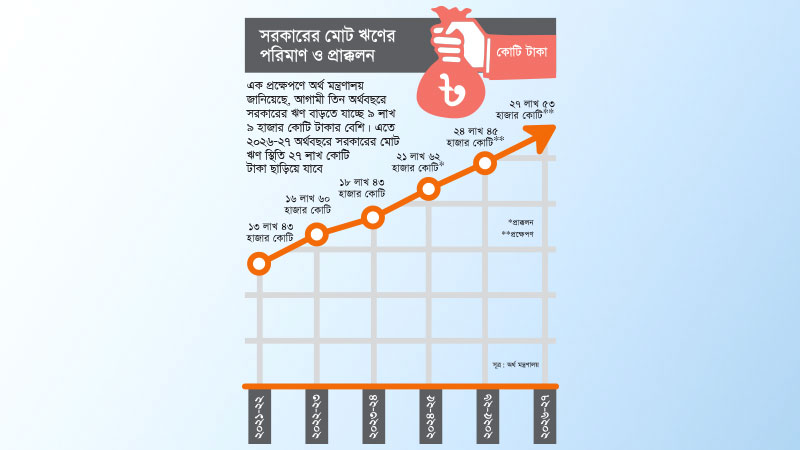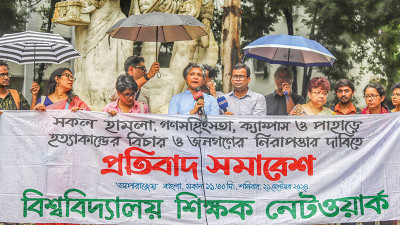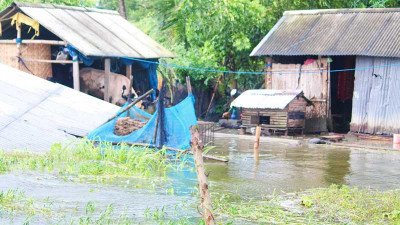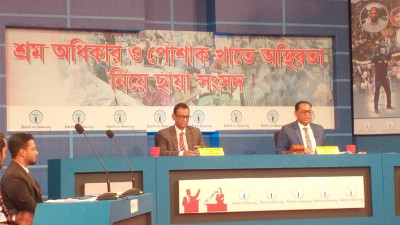 Bonik Barta graph
Bonik Barta graph The size of budget is expanding. But, revenue earnings are not
going up accordingly. As a result, the government is having to borrow more to
address the deficit. The Finance Ministry has prepared a midterm macroeconomic policy
statement for three fiscal years -- 2024-25, 2025-26 and 2026-27. It estimates
that in next three fiscal years, the government’s debt will increase by Tk 9.09
trillion as compared with the amount stated in this fiscal’s budget. This means
the government’s debt will surpass Tk 27 trillion in 2026-27 fiscal.
Economists see this debt scenario as worrying. They say that
due to increased debt the loan repayment is gradually swelling. In order to
meet the expenditure, the government is dependent on banks more than ever. On
one hand, the erosion of foreign reserve is on. On the other hand, the growth
in export earnings and remittance is not as expected. As a result, a concern is
in the making with regard to government’s loan repayment capacity. At the same
time, it is feared that the flow of bank loans in the private sector will go
down. Under such a situation, it is imperative for the government to be
attentive in revenue earnings alongside getting out of the tendency of
undertaking projects reliant on loans.
According to the Finance Ministry data, the borrowing of the
government stood at Tk 13.44 trillion in 2021-22 fiscal. It went up to Tk 16.6
trillion in the next fiscal (2022-23). The debt was stated to stand at Tk 18.44
trillion for the current fiscal of 2023-24. In the budget placed on Thursday
for 2024-25 fiscal, the debt was estimated at Tk 21.62 trillion. The estimate
for 2025-26 fiscal is Tk 24.45 trillion while it is Tk 27.53 trillion for
2026-27 fiscal.
The spending on interests is on the rise due to government’s
continued borrowing. Experts feel that this trend is adding to the worry for
the overall economy of the country. They mention that repayment of interests
has already become responsible for the second highest spending of the
government. It will further increase with the increasing government borrowing. The
erosion of foreign reserve is putting adding pressure on the government liabilities.
In the proposed budget placed before the Parliament on Thursday,
it is stated that loans of over Tk 2.5 trillion will be taken from different
local and foreign sources to address the budget deficit of next fiscal year.
And, Tk 1.14 trillion, which is around 14 percent of the total budget, has been
allocated for repayment of interests.
“There is a big reason to worry about the economy due to increasing
repayment of interests. The whole of the development expenditure is met with
local and foreign loans. It has to come from the revenue earnings,” Dr
Mustafizur Rahman, Distinguished Fellow at the Centre for Policy Dialogue, told
Bonik Barta.
“Spending on interests is now the second most expensive sector
of the government followed by Public Administration. A declining foreign
reserve is an added pressure. And, the principal amount of loans are repaid
with the borrowed money. This is not a sustainable scenario. The government
will have to be cautious in taking new loans. The spending priorities will have
to be rearranged,” he added.
In last few years, the government has undertaken quite a few mega
projects based on foreign loans. All these projects have been complete or about
to be complete. Installments of loans for some of the mega projects will begin
in the upcoming fiscal (2024025) after the expiry of the grace period. Padma
Rail Link, Networking Strengthening under Dhaka Power Distribution Company
Limited and Primary Education Development Program (PEDP-4) are such three projects.
Besides, the grace period for two mega projects – Ashulia Elevated Expressway
and Rooppur Nuclear Power Plant – will end in next two years. This will further
intensify the pressure on the government in terms of repayment of loans and
their interests.
Under the circumstances, it has become imperative for the
government to review the progress of the development projects, say the experts.
“The progress in implanting larger projects is slow. Things will get worse if
foreign investment is not enhanced. Therefore, the progress of the projects
should be reviewed. The government should not take out new loans for big projects
amidst the financial pressure,” Dr Selim Raihan, a professor at Dhaka
University’s Economics Department and Executive Director of the South Asian
Network on Economic Modeling (SANEM), told Bonik Barta.
The interest rates in the banking sector are going up in line with
the government’s tendency to borrow more money. The interest rate on 91-day
government treasury bills was below 2.5 percent even two years ago. That rate
now stands at 11.65 percent. The government has to pay more interests for long-term
loans. Nowadays, banks find lending money to the government is more profitable
than the individuals.
Entrepreneurs fear that due to the current scenario they will
face problem in getting necessary loans. Kamran T Rahman, president of
Metropolitan Chamber of Commerce and Industry (MCCI), told Bonik Barta, “There
may be a ‘crowding out’ effect on the economy if the government borrowing from
the banking sector goes up disproportionately. There may be a deficit for the
private sector investors due to this.”
Many industrialists think that the government should pay
attention to reduce spending. Anwar-Ul-Alam Chowdhury (Parvez), president of
Bangladesh Chamber of Industries (BCI), said, “The government should emphasize
mitigating deficit by spending less and borrowing more from foreign sources so
that it has to borrow less from the banking sector.”
Serving and former officials of the Finance Ministry are of
the opinion that Bangladesh is not yet in a dangerous situation with regard to borrowing.
“The government borrowing is on the rise, but there is no cause for concern as
yet,” former Finance Secretary Dr Mohammad Tareque told Bonik Barta.






